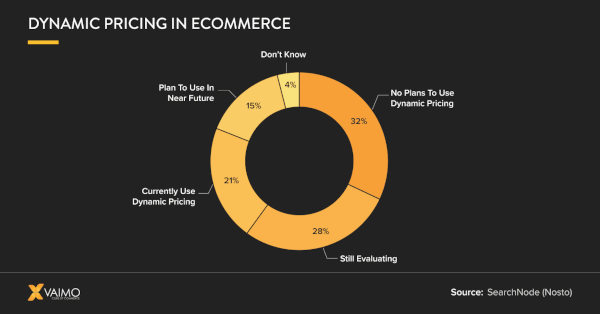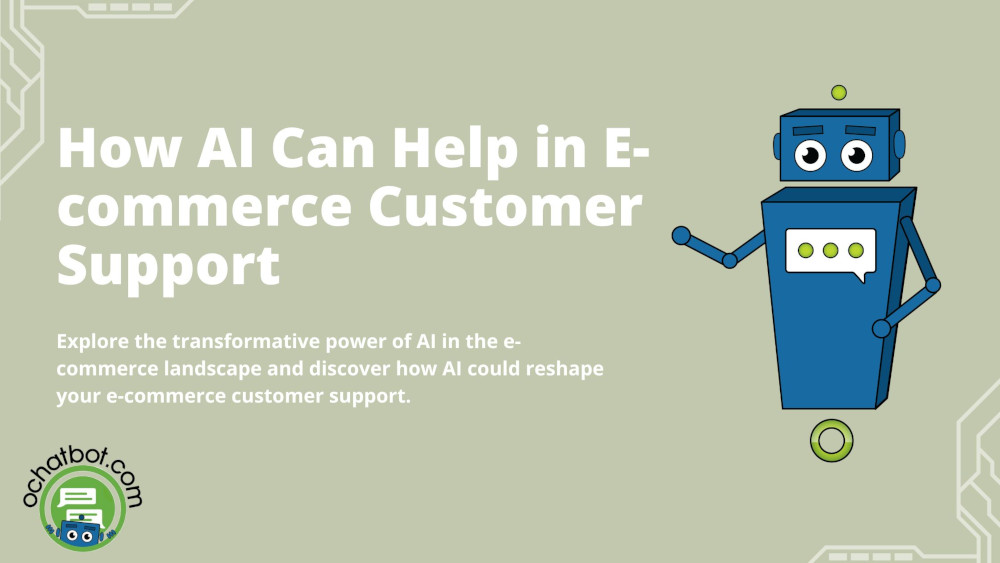Customer support is a pivotal element for success within the e-commerce landscape. From corporate behemoths to fast-rising start-ups, e-commerce businesses of all sizes are always looking for ways to improve their customer support. Right now, they’re all looking in the direction of AI.

Image sourced from precedenceresearch.com
The e-commerce industry is a realm where convenience and personalized experiences reign supreme. Tools like visual search and call center AI let even small businesses create an incredible customer experience. They also streamline workflows by automating a lot of processes.
This blog will explore the profound impact AI can have on e-commerce customer support. We’ll outline why customer support is so critical in e-commerce. We’ll discuss current trends in AI and customer support. Finally, we’ll offer tips on how AI can make your customer support more efficient and effective than ever.
Why Customer Support Is So Important for E-commerce:
Customer support is the bedrock upon which e-commerce businesses build their reputation and customer loyalty. An e-commerce business has no conveniently located shopfront on the high street. It has no amenable shopkeeper to charm customers. Consequently, customer support is a valuable e-commerce customer touchpoint. If a business wants to earn strong customer relations, it must do it through its interaction with customers.
So, customer support isn’t just about addressing customer issues. It’s a chance to impress and build trust. It’s about providing seamless, memorable, enjoyable shopping experiences. More than this, it’s about making customer feels appreciated and cared for.
When used to its full potential, customer support can serve many purposes. Here are the main functions it should serve:
- Resolving Issues: Customer support serves as the bridge between customers and businesses. First and foremost, it must address customers’ concerns, grievances, and questions promptly.
- Building Trust: Efficient customer support builds trust and confidence in the brand. It reassures customers a business will listen to and resolve their issues. This helps them feel confident buying from the business again.
- Personalization: Effective customer support can offer personalized recommendations and solutions. This can be a huge boost for customers’ shopping experience.
- Feedback Loop: Customer support is an e-commerce business’s best source of valuable feedback. Knowing the issues customers have is key for an e-commerce business to understand their customers’ needs and pain points.
- Competitive Edge: Strong customer support improves customer loyalty and advocacy. Relationships are what set businesses apart from competitors in a crowded marketplace. Customer support is critical for customer relations.

Image sourced from meteorspace.com
Current Trends in AI and Customer Support
The truth is that AI has been around for a while now. Its use is widespread in e-commerce and many other industries. It has already proven to be a game-changer in the customer support domain. If you’re still asking questions like ‘What is a call center solution with AI?’, you’re a little behind the curve.
Chatbots have a long history, starting in the 1960s. AI has been used in e-commerce customer support as early as the 2000s. Since then, technology has advanced, and the applications of AI have proliferated.
Chatbots are now ubiquitous, and AI-driven personalization is an industry standard. Sentiment analysis of customer feedback now allows for proactive issue resolution. Data-driven predictive capabilities have transformed inventory management and dynamic pricing. Voice assistants and AI-powered virtual shopping assistants are reinventing customers’ shopping journey.

Generative and Scripted AI to engage shoppers in conversational eCommerce.
Create happy customers while growing your business!
-
1 out of 4 shoppers make a purchase on average*
-
5% to 35% Increase in AOV*
-
25% to 45% Reduction in Support Tickets
WE GUARANTEE RESULTS!
These developments continue to reshape customer support in e-commerce. AI is helping businesses enhance customer support in a big way and streamline operations at the same time.
Crucially, AI is now widely accessible and widely used in e-commerce customer support. So, if you’re an e-commerce business owner who isn’t taking advantage of these trends, you’re missing out.
7 Ways to Use AI in E-commerce Customer Support:
1. Chatbots for Instant Responses
Provide 24/7 support with chatbots. No one likes talking to a robot, but chatbots bring huge reductions to customer wait times. Anyway, they’re getting harder and harder to spot.

Image sourced from dashly.io
AI-driven chatbots excel at handling routine inquiries and offering quick solutions. Their language processing capabilities allow them to engage in meaningful conversations with customers. They can resolve simple queries while making interactions feel personalized and seamless.
Moreover, they free up human support agents. Agents can focus on more complex customer needs. So they improve the efficiency and effectiveness of your support team.
Our advice here: Make sure you still have a capable team of human agents handling more complex issues.
2. Personalized Product Recommendations
AI is a necessity for achieving the personalized experiences customers expect nowadays, including features like being able to choose your own order delivery date. Personalization makes a customer feel recognized by a brand and increases trust. Moreover, it can help businesses make the most of their existing customers.
AI and chatbot marketing can analyze masses of customer data and offer tailored suggestions to customers. Personalization helps businesses find cross-selling and upselling opportunities. It can make a big difference to the average order value and overall revenue.
By utilizing machine learning algorithms, e-commerce businesses can continually refine a customer’s recommendations. This ensures they remain relevant and enticing to each customer. Over time, this will result in getting more business from each new customer. Combined with strong customer loyalty programs, this can be a huge boost to revenue.
3. Voice Assistants for Hands-Free Shopping

Free-to-use image sourced from pexels.com
AI-driven voice assistants let customers shop or inquire about products using voice commands. This convenience has been shown to make a big difference in customers’ experiences.
Voice-activated assistants like Amazon’s Alexa or Google Assistant provide a hands-free shopping experience. This makes shopping online more flexible and easy for customers. It allows customers to multitask and also helps those with physical limitations.
AI voice assistants also have natural language understanding. This means they can process customer queries and offer accurate responses. So, they’re especially effective for enhancing customer support.
4. Sentiment Analysis
This is where AI has really changed what’s possible for e-commerce customer support. AI can analyze customer feedback and social media comments at a scale humans can’t. It can process enormous data sets and discern sentiments and trends the human eye couldn’t.
This capability allows businesses to take a proactive approach to addressing customer concerns. For instance, if a multinational company receives a surge in customer feedback on its Israeli domain, AI can alert support teams. They can then investigate and resolve an issue before it develops.
This means businesses can solve problems before they even occur. It is a game changer for improving the quality and responsiveness of customer support.
5. Inventory Management
The application of AI’s data-driven predictive capabilities extends to inventory management, too. It can help businesses run more efficiently and avoid stock issues caused by human error.
Once again, AI can analyze enormous data sets that no human workforce could. It can consider factors like historical sales, market trends, and external factors like weather or the economy. It uses these insights to forecast product demand and delivery needs. Businesses can then arrange stock in accordance with these predictions.
This data-driven approach optimizes inventory levels, reducing the risk of overstock or stockouts. In essence, AI ensures that products are available when customers want them. It is another way e-commerce businesses can provide a more seamless shopping experience.
Paired with remote desktop software like RealVNC, AI inventory systems can make work more flexible for employees, too. So they can improve business while reducing labor costs.
6. Dynamic Pricing
AI algorithms are increasingly used for dynamic price adjustments. There are tools available that will adjust prices based on a range of factors. These factors can include demand, competitor pricing, and even individual customer behavior.

Image sourced from binmile.com
Dynamic pricing is another way AI helps e-commerce businesses to maximize revenue. It helps businesses price products to the point where customers find them attractive and valuable.
The use of AI in this context helps you stay competitive and agile in a constantly changing market. It ensures your pricing strategy remains responsive to market dynamics no matter what.
7. Visual Search
AI can also help customers find products online in new, intuitive ways.
Visual search features allow customers to search for items using images from their own photos or the web. AI analyzes the visual content and matches it to products in your inventory, reducing the reliance on text-based searches. Investing in these features can make customers’ shopping experiences more intuitive and engaging.
This innovative approach enhances product discovery and boosts sales. It’s particularly useful for items that are challenging to describe with text alone.
Future Proof Your E-Commerce Store With AI
In the world of chatbots, predictive analytics, and AI call center solutions, AI isn’t just a benefit for e-commerce customer support; it’s a necessity. AI is redefining the e-commerce customer support landscape. It’s enabling businesses to provide efficient, personalized, and round-the-clock assistance to their customers. If you’re not taking advantage of the possibility of AI, you risk getting left behind.
As technology continues to advance, those who embrace AI as a tool are poised to thrive in the future. In the realm of digital asset management, AI serves as a dynamic, optimizing asset organization and retrieval with its intelligent learning algorithms, ensuring your e-commerce is always a step ahead. So, if you want to lead the e-commerce pack, it’s time to embrace AI. Unlock the potential it holds for revolutionizing customer support in your online store. Implementing these AI-driven strategies into your e-commerce customer support framework can propel your business to new heights.
- The Rise of Intelligent Websites - February 19, 2025
- Top Trending Products to Boost Your Shopify Store in 2024 - September 4, 2024
- AI Terms Glossary: Key AI Concepts You Should Know - August 22, 2024


